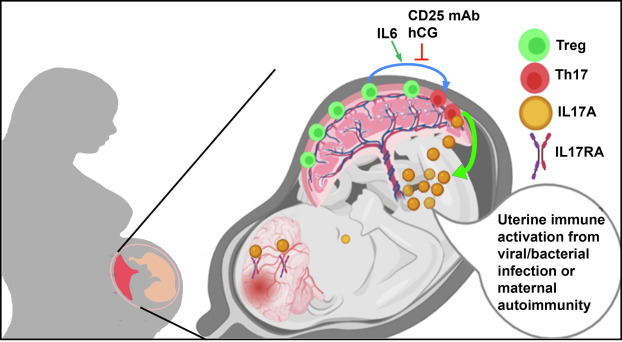Human Immunology Volume 82, Issue 5, May 2021, Pages 379-384
In utero immune programming of autism spectrum disorder (ASD) (自閉スペクトラム症(ASD)の胎内免疫プログラミング)
Sukanta Jash, Surendra Sharm
Department of Pediatrics, Women and Infants Hospital of Rhode Island-Warren Alpert Medical School of Brown University, Providence, RI, United States
Abstract
Maladaptation of immune tolerance at the maternal-fetal interface affects balanced maternal-fetal cross-talk and placental health and is associated with adverse pregnancy outcomes. The concept of in utero programming of childhood and adulthood diseases has revolutionized the research on the role of pregnancy in maternal, neonatal, and adult health. However, it is not yet well understood whether dysregulation of uterine immunity contributes to any health consequences during childhood or later in life. Recent observations in mice and humans have strongly supported the notion that uterine immunity during pregnancy determines the health trajectory of the offspring and significantly impacts cognitive function and mental health. Importantly, IL-17a producing Th17 T cells have been projected as the main contributors to heterogeneous pathological and behavioral phenotypes associated with autism spectrum disorder (ASD). However, since normal pregnancy is associated with little or no Th17 cells at the maternal-fetal interface, it is not clear how and when the Th17 T cells are generated and which interventions can ameliorate the ASD-like features in newborns. We propose that infection-associated uterine immune activation within a critical window of development may propel trans-differentiation of Th17 T cells that eventually affect fetal brain development and induce ASD-like behavioral phenotype in the offspring.
母体と胎児の接点における免疫寛容の不適応は、バランスのとれた母体と胎児のクロストークと胎児の健康に影響を与え、妊娠中の有害な転帰と関連している。小児期や成人期の病気を胎内でプログラムするという概念は、母体、新生児、成人の健康における妊娠の役割に関する研究に革命をもたらした。しかし、子宮免疫の調節不全が小児期や成人期の健康に影響を及ぼすかどうかは、まだよくわかっていない。近年、マウスやヒトを用いた研究により、妊娠中の子宮免疫が子孫の健康状態を左右し、認知機能や精神状態に大きな影響を与えるという考えが強く支持されている。重要なことは、IL-17aを産生するTh17 T細胞が、自閉症スペクトラム障害(ASD)に関連する異質な病理学的および行動学的表現型の主な原因であると予測されていることである。しかし、正常な妊娠では、母体と胎児の間にTh17細胞がほとんど存在しないため、Th17 T細胞がいつ、どのようにして生成されるのか、また、どのような介入をすれば新生児のASD様症状を改善できるのかは明らかになっていない。我々は、感染に伴う子宮免疫の活性化が、発達の重要な時期にTh17 T細胞の分化を促し、最終的に胎児の脳の発達に影響を与え、子孫にASD様の行動表現型を誘発するのではないかと考えている。
Keywords
T helper 17 T cellsInterleukin 17Autism spectrum disorderRegulatory T cellsCortexLipopolysaccharidePolyinosinic:polycytidylic acidUterine immunity dysregulation
https://doi.org/10.1016/j.humimm.2021.02.002

